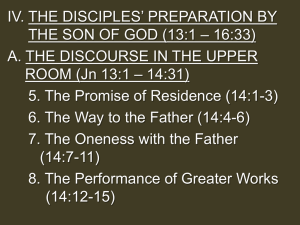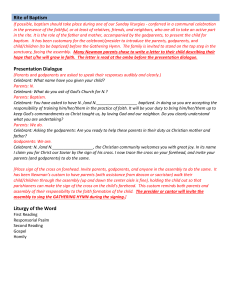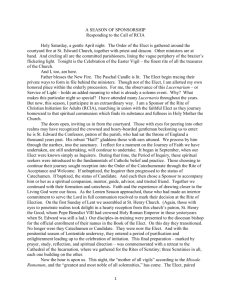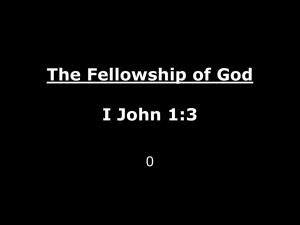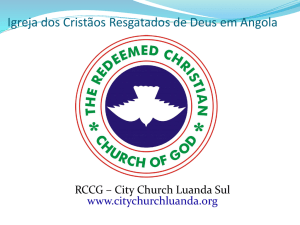The Baptismal Covenant - Worship, Downtown (in Cobourg)
advertisement
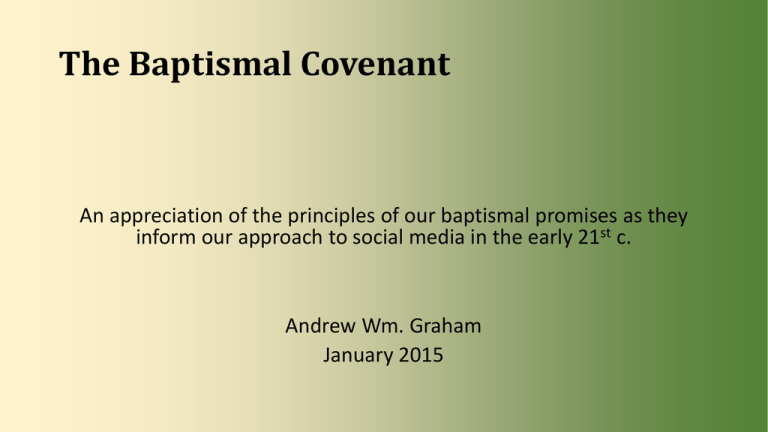
The Baptismal Covenant An appreciation of the principles of our baptismal promises as they inform our approach to social media in the early 21st c. Andrew Wm. Graham January 2015 1. Celebrant Do you believe in God the Father? People I believe in God, The Father almighty, creator of heaven and earth. 2. Celebrant Do you believe in Jesus Christ, the Son of God? On the third day he rose again. He ascended into heaven, and is seated at the right hand of the Father. He will come again to judge the living and the dead. 3. Celebrant Do you believe in God the Holy Spirit? People I believe in God the Holy Spirit, the holy catholic Church, the communion of saints, the forgiveness of sins, the resurrection of the body, and the life everlasting. 4. Celebrant Will you continue in the apostles’ teaching and fellowship, in the breaking of bread, and in the prayers? People I will, with God’ s help. 5. Celebrant Will you persevere in resisting evil and, whenever you fall into sin, repent and return to the Lord? People I will, with God’s help. 6. Celebrant Will you proclaim by word and example the good news of God in Christ? People I will, with God’s help. 7. Celebrant Will you seek and serve Christ in all persons, loving your neighbour as yourself? People I will, with God’s help. 8. Celebrant Will you strive for justice and peace among all people, and respect the dignity of every human being? People I will, with God’s help. 9. Celebrant Will you strive to safeguard the integrity of God's creation, and respect, sustain and renew the life of the Earth? People I will, with God’s help. How does the Baptismal Covenant inform our thinking about responsible use of social media? 1. The God and Father of Jesus, in the fellowship of the Holy Spirit, has called us into a new way of life. The power of this new life is demonstrated in the ways that God by grace transforms Her people. God’s love changes and renews us. 2. We no longer live for ourselves but for Christ alive in us. Living out the promises of our baptism is one aspect of this process of ongoing transformation, as day by day we move closer to being who God created us to be. 3. This work of sanctification in us is not solely for us to experience and enjoy, but to share by serving one another in ways that reflect Christ the servant in us. 4. New media technologies extend the power of our language. To continue in the apostles’ teaching and fellowship no longer demands our physical proximity to one another. Disciples may share their hearts and minds using many new ways to communicate over vast distances. They may pray together over the telephone or Skype, Twitter, or Facebook. However, this is not true for the laying on of hands, which is to be felt, or the breaking of bread, which requires people to physically share bread blessed and broken and the new wine of the kingdom poured out and sanctified. Social media cannot substitute for tactile actions that require us to be embodied to one another. 5. Our empowerment by these technologies comes with a price. A generation ago we could not anticipate the temptations to pride, immodesty, immorality and licentiousness that exist now. The internet and social media has brought recklessness, callousness, a new cult of celebrity and other social ills into the mainstream of western life, without bringing any obvious solutions. An environment where God’s people can be reconciled is very important now, and it remains to be seen whether online communities of faith will rise to the challenge of true gracious fellowship that holds brothers and sisters accountable for their transgressions and furnishes environments where sinners may repent and return to the Lord. 6. The proclamation by word and example of the good news of God in Christ is possible in many new ways, dependant only on the imagination of the social media evangelist. The challenge with these new tools is to ensure that they are in the service of the message rather than overshadowing it. [leading to ...] 7. New media technologies afford us new means to serve one another, and serve Christ in one another. Each of us is now empowered to immediately address the world. From a single cellphone anyone can proclaim a message of hope or despair more widely and immediately than the most powerful world leader of the past generation. This enormous power permits much good, and calls us to be responsible stewards of the messages we send, for we are representatives of God’s love. As “love does no harm to a neighbour” it is especially incumbent upon people of faith to be careful when using social media, that our best thinking and highest values be represented in what we write, and what we read. When we seek to inform and correct one another we will want to do it gently in the spirit of caring and with hope for reconciliation. [leading to …] 8. Because the reach and outreach of our thoughts and words is magnified in social media, our ability to focus attention on situations and stories from near and far is likewise amplified. We have the ability to bring the eyes of the world immediately to any tragedy, miscarriage of justice, war and place where people are degraded and suffering. What should concern us is what we do next. It is a challenge to tell these stories in ways that show respect for the dignity of the people in such circumstances and to use what we learn to bring about healing for the people and transformation of the unjust structures at the heart of the situations we see. To an extent, we are what we broadcast. Close investigation of the technology sector confronts us with the human suffering that has gone into the products we carry: tablets, phones, etc. It is important to be aware of the messages, but also the human costs of the media. [leading to …] 9. Landfill sites full of disposable technological products, batteries improperly disposed of, ruined waterways, poisoned air, pollution, overcrowded cities, underpaid workers, high stress, skies that can no longer been seen at night, new anxiety disorders, and the breakdown of social cohesion are all to some extent side effects of the new always-on always-connected nature of social media and the internet. It is incumbent on us to weigh the value of what we are gaining against what we have destroyed and cannot recreate. Made in the image and likeness of God, we are remaking this world in the image and likeness of humanity, and what we are producing is not beautiful. We are a part of God’s creation, and we urgently need to respect, renew, and sustain ourselves so that we have the tools to extend the same to the creation that nurtures us.




